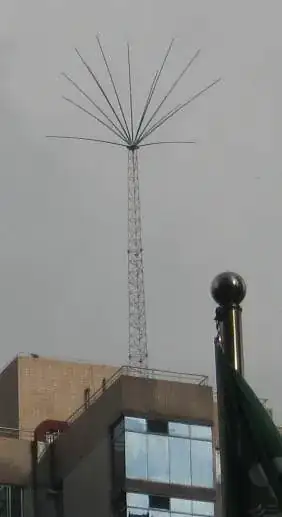On a recent trip to China I photographed a number of "antennas" that I do not recognize. Are they even antennas?

- 7,948
- 4
- 18
- 51
- 71
- 3
-
1Hello and welcome to ham.stackexchange.com! – rclocher3 Jul 30 '20 at 13:58
-
1Lightning rods? Or lightning-repelling rods (there's no such thing but people try)? – tomnexus Jul 30 '20 at 20:31
-
1@tomnexus Lightning rod, yes; and nope, we can't repel lightning and make it retreat back up into the cloud. :-) – Mike Waters Jul 31 '20 at 02:05
-
It could help to know precisely where these pictures were taken. – Phil Frost - W8II Jul 31 '20 at 17:52
-
Both devices were seen in Kunming, Yunnan. I can't be more precise than that. – VE3LNY Aug 03 '20 at 22:05
-
I like that the second one has a staircase leading up to a crow's nest. From now on, I'm going to propose that every lightning rod should have a crow's nest. But where I live, the spiral stairs won't work because it will have to be handicap accessible. – Solomon Slow Aug 05 '20 at 21:37
2 Answers
A possibility for their use is suggested by the small "globes" at the free ends of the conductors in the 2nd photo. If this array of conductors was intended for lightning protection, they better would have very sharp tips in order to reduce the flashover voltage appearing at the ends of the conductors. Also, ~vertical conductors would be better for lightning protection, as they would better protect the structure to which they are attached.
Instead those conductors might be co-driven radiators of a semi-wideband, ~directional antenna system.
- 2,922
- 7
- 18
-
1Those free-end "globes" look more like a few sharp "probes" to me. Exactly as you suggest, for corona discharge. – glen_geek Jul 31 '20 at 14:39
-
Nice answer. If you click on the bottom photo to enlarge it, those globes appear to be where the short fine wires -hopefully with very sharp ends- are attached. – Mike Waters Jul 31 '20 at 17:25
Those are not antennas, but intended to be lightning dissipators. Basically, they are a type of lightning rod.
A lightning rod or lightning conductor (UK) is a metal rod mounted on a structure and intended to protect the structure from a lightning strike. If lightning hits the structure, it will preferentially strike the rod and be conducted to ground through a wire, instead of passing through the structure, where it could start a fire or cause electrocution.
The following related questions and answers go into more detail:
The lightning dissipator consists of many small spikes and prevents a strike by slowly discharging through each little spike.
Do lightning rods attract or do they help prevent lightning?
https://physics.stackexchange.com/questions/65825/does-a-lightning-rod-prevent-lightning-strikes
How does a higher antenna reduce rain static on a lower antenna?
In summary, several answers support that they can prevent a lightning strike under some circumstances. Others disagree and vehemently declare that they are of no value whatsoever. I strongly believe that the truth lies somewhere in the middle.
On top of this corona-discharge negative ion generator is an effective (if fragile) ion emitter, which appearance and function is very similar to those photos in the question. There were actually eight of those .005" diameter stainless steel wires.
(No longer manufactured)
- 7,948
- 4
- 18
- 51
-
1But but all of the articles you link to say there's no way to divert lightning or reduce the chance of a strike. I also wrote an answer about it. I do agree that's what these things in the picture are. – tomnexus Jul 31 '20 at 03:37
-
"In summary, the consensus is that they can prevent a lightning strike, under some circumstances." The only article you linked which seems to support that consensus is one you wrote. – Phil Frost - W8II Jul 31 '20 at 04:41
-
After prolonged thought: I upvoted it for answering OP's question, but I had to leave this comment: The conditions under which these prevent lightning strikes is that lightning strikes suddenly become sentient and pity the fool who spent so much money on these things. – Marcus Müller Jul 31 '20 at 07:11
-
@PhilFrost-W8II Maybe I shouldn't have used the word consensus. However, some answers in the questons I linked to do indeed support their effectiveness. However, from my extensive studies and lab research on corona discharge ion emitters, the ones pictured would work better if there were fewer of those pointed wires, or even a single sharp point. However, a sustained corona discharge will wear the sharp points down fairly quickly, thus the need for multiple sharp points to extend the life. – Mike Waters Jul 31 '20 at 16:53
-
Anecdotally, barns in the 19th and 20th century equipped with lightning rods burned down much less often than barns without them. Sorry I don't have a reference. – Mike Waters Jul 31 '20 at 16:55
-
@PhilFrost-W8II Question edited, thank you. I stopped short of saying "...under *many* circumstances", which is my firm belief after studying countless articles about this over many years. – Mike Waters Jul 31 '20 at 17:06
-
@MikeWaters you are hung up on a false dichotomy. Franklin was wrong about why lightning rods worked, but he was not wrong about their efficacy in preventing structure fires. They work by diverting lightning, not dissipating it, and this is well supported in the scientific literature and in fact every reference you have cited, excluding the one you wrote yourself. – Phil Frost - W8II Jul 31 '20 at 17:50
-
@MikeWaters You also need to accept that experiments showing charge dissipation on a small scale do not necessarily translate to any significant benefit in lightning dissipation. No one will doubt I can extinguish fire with a garden hose. But I don't think you'd claim a forest fire can be extinguished with a garden hose even "under some circumstances". – Phil Frost - W8II Jul 31 '20 at 17:56
-
@PhilFrost-W8II If you mean that air ionizer photo, I was not implying that at all. Only that there were similarities. Also, I think we have read different scientific articles, not in those answers. Respectfully, what jumps out at me in those linked Q&As is that a simple old-fashioned lightning rod provides enough protection to warrant their installation. – Mike Waters Jul 31 '20 at 18:14
-
2May I suggest sorting this out by adjusting the answer to claim only that they are intended to be lightning dissipators, without claiming they are effective (or not)? That is all that is relevant to answering the question asked. – Kevin Reid AG6YO Jul 31 '20 at 18:27
-
-
@MikeWaters Again, false dichotomy. Lightning rods are effective, but not because they prevent strikes. They are effective because they divert the strike current. The answer still claims "they can prevent a lightning strike under some circumstances", and I'm going to maintain my downvote for spreading misinformation until that's removed or you can explain exactly what those circumstances are and provide some legitimate studies that demonstrate the effect. – Phil Frost - W8II Jul 31 '20 at 19:54
-
@PhilFrost-W8II Ah, I see where you are coming from! The #1 main point that I was trying to get across is that they are effective, and implying otherwise is doing a disservice to any property owners who may read this. Suggested edits welcome! :-) – Mike Waters Jul 31 '20 at 20:17
-
2@KevinReidAG6YO If you don't mind, let's not move these comments to a new chat at this time. Some folks that may have something else to contribute here may not be inclined to visit it. – Mike Waters Jul 31 '20 at 20:21
-
Soon, we (myself included) should move a lot of this to answers here, or to one of the related questions in this search where it will be much more relevant. – Mike Waters Jul 31 '20 at 20:23

